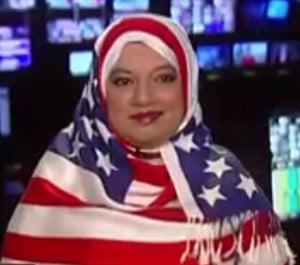Heralded Muslim feminist Mona Eltahawy asks in the ever-tabloid Toronto Star to be allowed to confuse you, the reader, by virtue of the apparently contradictory labels self-assigned to her socio-political and religious beliefs. The point of article (as it become somewhat clear in the last few paragraphs) is to shed light on how, despite her unorthodox views on Islam, and particularly gender in Islam, the faith “belongs” to her as much as to any other Muslim, more orthodox than her or not. This perspective frames her support for the Park51 community center near Ground Zero in New York City; a support caught between ” [televangelist] Bill Keller’s right wing: bigoted and xenophobic [..and] the Muslim right wing, which uses Islam…to fuel its misogyny.”
Had Eltahawy written strictly about how, despite her activism against what she claims is the “Muslim right wing,” she still supports the right of Park51 to be built at its current location because she is a Muslim, thus acting out of solidarity, then there could have been potential. Such a route could have provided a perspective for understanding the importance of the mosque being built beyond just issues of worship for a select group in the heart of Manhattan.
Unfortunately, Eltahawy only hints at this sort of a discussion at the end of her article, which is both sparse and riddled with confusing literary devices and a questionable comparison—rightly so, perhaps given the title of the piece.
The vast majority of her piece focuses on herself. “Let me, a Muslim Feminist, confuse you” does not shed light on admirable solidarity beyond strong religious disagreements in the face of religious discrimination. Rather, it highlights a growing problem in the unhappy marriage between a certain brand of feminism and Muslim identity: an essentialist, self-congratulatory discourse working as a conduit for Islamophobes to buttress their bigotry:
I moved to the U.S. 10 years ago after marrying an American, but when we divorced two years later I got into my car and spent 18 days driving alone to New York City. It was my American pilgrimage. My reward was a community of like-minded Muslims together with whom I prayed behind Amina Wadud, an American Muslim scholar, in the first public female-led mixed-gender Friday prayer. Without a head scarf and on my period, I prayed next to a man — sacrilege to many but a delight to me. [italics added]
I understand what she’s doing: she’s painting a portrait of her unorthodoxy so that the reader could then be further confused for her support for a generally mainstream mosque being built on “contentious ground.”
But this then begs two questions. First, when the vast majority of your argument for your support for such a campaign consists of a biographical sketch, is not the main point diluted? Additionally—and this is the one that really gets me—is it really all that confusing? Why is it confusing for someone (especially one who identifies as an activist fighting against injustices) to be supporting constitutional rights of American citizens in the face of bigotry and ignorance? Is there something about supporting the right of menstruating women to pray and supporting the banning of the niqab that puts one so above a Park51-sort of campaign that her support should astonish us?
She preaches tolerance and intra-religious pluralism and supports the building of a religious community center by an organization built on interfaith dialogue and a vague sort of New-Age Sufism?! Fascinating! Astonishing!
Eltahawy’s voice is an important voice to be heard within the vast Muslim community, particularly North America, where she has become a vocal part of the discursive fabric on issues pertaining to Islam, the Middle East, and women. Yet her occasional legitimate critiques and perspectives become muddled with pieces such as this, which fuel bigoted ideas regarding the Muslim community and completely deny nuance in the religion itself, as well as the various Muslim communities across the world. This, of course, is not isolated to Eltahawy; it applies to numerous other Muslim women who carry the same framework for discussion (including those on the flip side). I’m looking at you, Asra Nomani!
In self-centered articles like Eltahawy’s and Nomani’s, they rage against what they believe to be an imposition of a monolithic Islam, while completely denying the very present reality of the very diverse forms of Islam that exist in everyday communities, in both practice and belief and beyond sectarian differences. Be it in usul ul-fiqh in any one of the Muslim communities dispersed throughout the world, one will find that there is much flexibility, much difference of opinion and in spirit, especially in view of Islam’s intellectual history and, most important, the Prophetic tradition. There is much room for understanding and evolution.
Yet by continuously expressing such opinions framed in self-led narratives on personal experiences in particular Muslim communities, activists such as Eltahawy and Nomani not only promote a sort of essentialism but also perpetuate the painfully stereotypical image of Islam and Muslims as medieval and backwards; the faith itself, in particular, is portrayed as one in heavy need of a Martin Luther-esque sigh-inducing reform.
Yes, there are changes to be made and yes, there is dialogue to be had. But first, let’s stop with the pornographic portrayal of gender in Islam which presents an exploitative perspective on the nuanced subject, meant to satiate the desires of those lusting over reasons to further justify their bigotry. And, in particular, let’s end personal narratives coming to take on perspectives regarding the entirety of a diverse community and faith.














